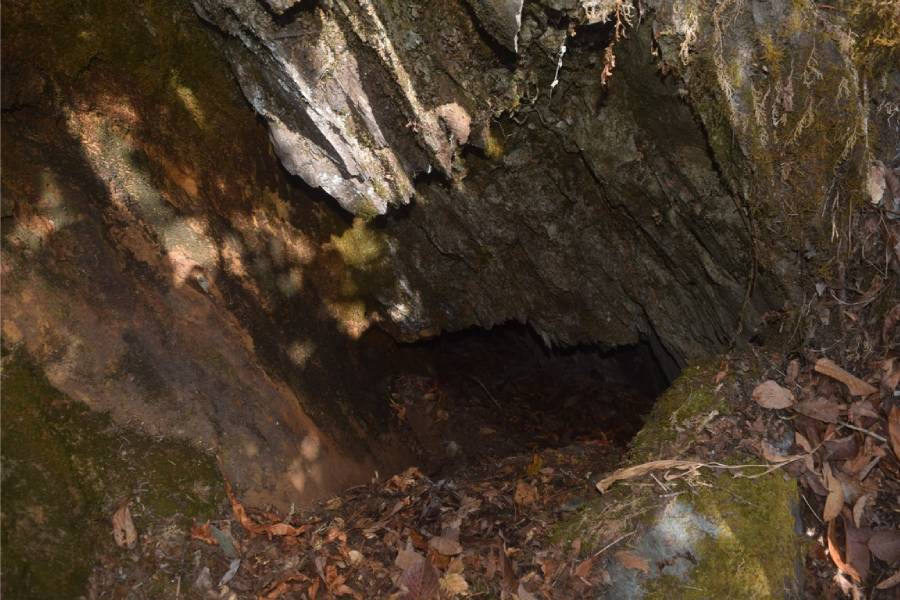Myagdi. The tunnel of the copper mine in Thandakhani, Raghuganga Rural Municipality-6 of the district has started to be filled. Mining, which is considered the ancestral profession of the Chhantyal community, has been stopped for years and the tunnel has started to be filled due to the lack of protection of the copper mine discovered by the ancestors.
A local says that a copper mine tunnel located at the root of a stove near an old village has been filled. Local Man Chantyal said that although there were traditionally two copper mining tunnels in this place, one is now buried and the other is about to be buried.
‘There are many ruins of copper mines around the village, copper ore is found in abundance around the tunnels, but with the closure of mining, the risk of even the remains of the mine being erased has increased,’ he said.
According to him, there are more than a dozen copper mining tunnels in places such as the Rumale village cliff and Ichhimajh cliff at the head of Thandakhani village. Saying that copper deposits are still visible in most of the tunnels, Chantyal mentioned that due to lack of protection, the tunnels have started to be buried due to landslides and floods.
‘At that time, after the tax paid to the government for copper mining was increased, some people stopped mining in this area and moved their settlements elsewhere, while others changed their professions,’ he said.
Tekjit Chantyal, ward member of Raghuganga Rural Municipality-6, said that after the government stopped mining in the old village of Thandakhani, the settlements were relocated to embrace agriculture.
‘Our “The history of our ancestors was not about farming and raising livestock, but about living where there was a mine and making a living by mining,” he said. “But later, when the government started imposing taxes and the locals could not afford to pay the taxes, the mining profession was in crisis,” he said.
Along with the ruins of houses in the village, the copper slag that was thrown away after the metal brought from the mine was melted down and the copper extracted can still be seen all around. Locals say that since the fire in the traditional furnace melted the metal and left the ash on the side, there is no farming in the old village and it is difficult for trees to grow.
Locals say that the entire village moved to the current Thandakhani, which is about 15 minutes away from the old village, about a hundred years ago after their ancestral profession was closed and they had to work in agriculture. At that time, the Chhantyal community used to smell the soil and rocks on the cliffs to determine whether there was metal or not.
In the absence of development of tools and equipment, local senior citizens say that tunnels were made inside the mountains with homemade tools such as axes, spades, axes, chisels and chisels and metal was mined by burning the hemp of the Ningala inside the tunnels.
Although the ancestral profession of the Chhantyal community was mining, after the government increased taxes, they had to abandon that profession and engage in other professions, said Khim Maya Chhantyal, former principal of Malika Basic School in Thandakhani. .
‘Discovering metal mines in such cliffs and mountains without the use of any technology and without research reflects the expertise of our ancestors. We believe that if research is carried out in this area even today, abundant minerals can be found. The old mines have become ruins, there has been no initiative from the government level for excavation,’ said former PMO Chantyal.
Along with Thandakhani, there are many copper mine tunnels near the settlements of Kuinekhani, Chaurkhani, Manglekhani, Gurja Khani, Malkbang, Machim, Okhar Bot, etc., which are the traditional settlements of the Chantyal community in Myagdi.
Says that after the mine was closed, the rate of recruitment of young people from the Chantyal community to the Indian and British army was high at that time, and now they are involved in foreign employment and business.
Ward Chairman of Raghuganga Rural Municipality-6 Man Kumar Sherpunja said that traditional mining has become an important basis for economic development and that if the mines can be excavated, the state will earn income and create employment for the locals.
‘The government has adopted a policy to excavate old mines, but it is not yet clear what role the local government will play. If the federal and provincial governments give local governments the authority to excavate mines with a clear concept, the closed mines can be reopened,’ he said.































प्रतिक्रिया दिनुहोस्